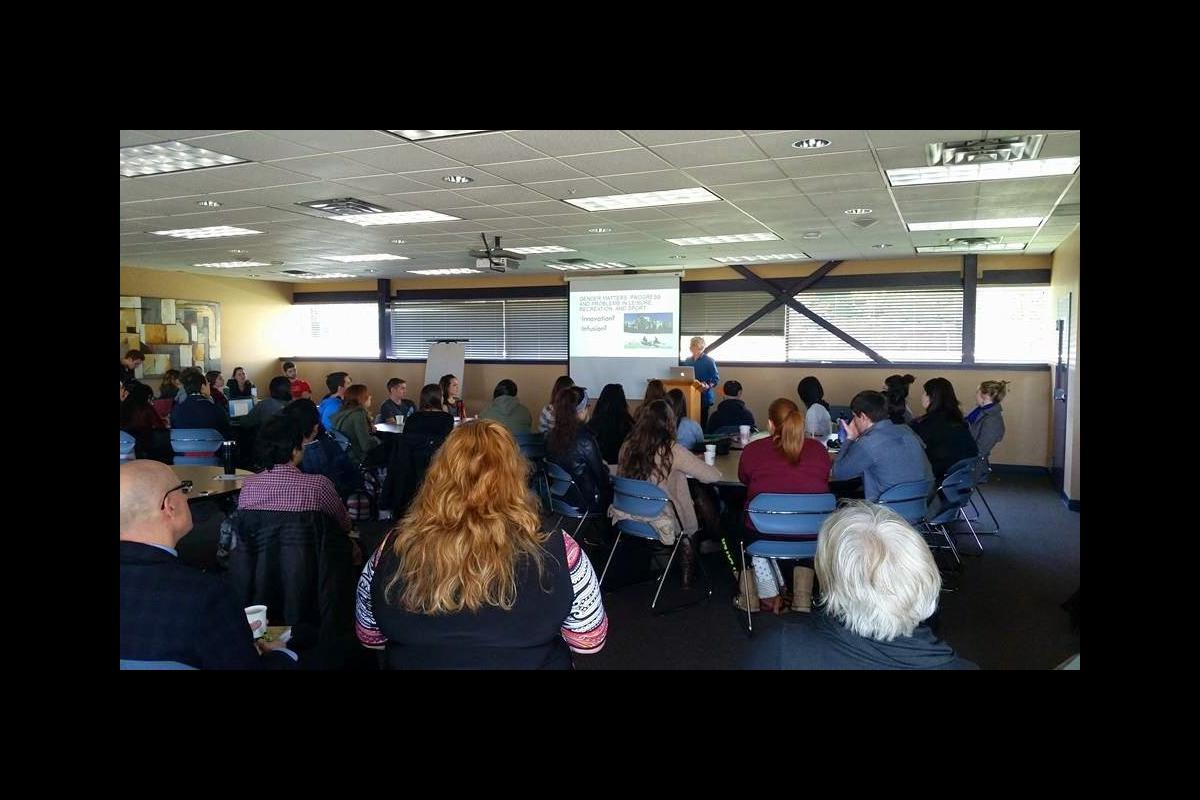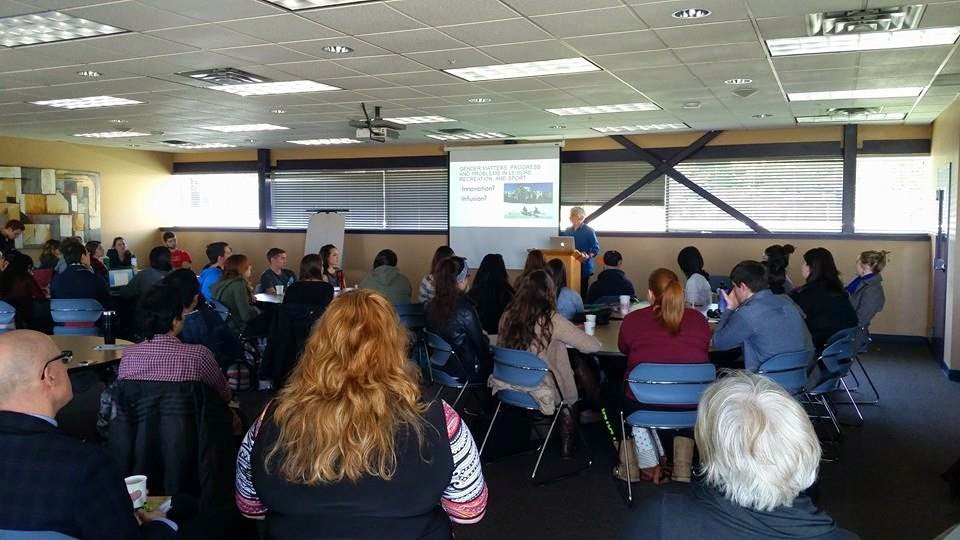
 On March 3rd, Dr. Karla Henderson from North Carolina State University, US, gave a presentation on the topic: Gender Matters: Progress and Problems in Leisure, Recreation, and Sports. Her presentation sparked great discussion on the matter of gender and leisure.
On March 3rd, Dr. Karla Henderson from North Carolina State University, US, gave a presentation on the topic: Gender Matters: Progress and Problems in Leisure, Recreation, and Sports. Her presentation sparked great discussion on the matter of gender and leisure.Reflections from Dr. Grant Murray, Professor in the Faculty of Management
Dr. Karla Henderson began by highlighting the ways that gender norms and expectations are embedded in the structures and practices of our everyday lives, from trips to the mall to the leisure activities on which she focuses. With a mix of academic and pop culture references (Barbie!), humour and keen insights, Dr. Henderson illustrated how our culture constantly creates and recreates gendered rules and expectations that are fundamental to what we perceive and how, in turn, we are perceived. She also illustrated how research in the area has evolved over time, moving from a time when women were largely invisible in leisure studies (just 50-60 years ago!) to a focus on differences between the genders, to an emphasis on women’s experiences, to more recent gender analyses that include men and boys. She also reminded us that we are not just defined by our genders, and that we all experience the ‘intersectionality’ of gender with other markers of our identities: race, age, religion, income and so on. Using the concepts of equality and equity, Dr. Henderson explained that while some progress has been made, many challenges remain in creating, managing and adapting recreation and sports programs and experiences that maximize inclusivity, equity, and benefits. As students, practitioners and participants in the field, we were left with the goals of exposing and disrupting false claims of gender equity, and (re)creating a culture and a world that empowers us all. A good reminder as I drive off to the mall to pick out new cleats for my daughter…
Reflections from MASLM Students
Dr. Henderson’s presentation on women in the realms of leisure, recreation and sport was a fascinating and critical examination of the ascension of women’s issues in both academic and practical settings. Some people are quick to claim that women have reached a status of fundamental equality with men in many leisure settings. From a superficial standpoint it is easy to see why – women have become the focus of a great deal of tourism and leisure research and have more recreational opportunities than ever before. However, Dr. Henderson urged that while there has been progress, there are still great strides to be taken towards true gender equity. In order to address the inequalities that prevail today there are several actions that must be taken. Existing narratives involving the role of women in leisure and long-standing notions of gender must be challenged. Additionally the pursuit of equity in leisure must strive to address the needs of all women, no matter how diverse. Everyone within society has a role to play in co-creating a more equitable future for women.
--Jeff Wahl
Dr. Henderson shared an interesting relationship between equity and equality. Being in a male-dominated world we usually do not think from a perspective of equity. The most interesting example I found was where she explained how boys and girls washrooms are made equal in public areas. However she advised that while making washrooms for women and men, people forget that both have different requirements. Since people do not look at this factor we have long queues after girls’ washrooms. She emphasized that one should look at equity which means, instead of providing equal opportunities, one should quantify the needs and then should try and fulfill the requirements.
It will be nice to see if the new perspective of equity can help in reducing the discrimination caused due to gender bias. It is new way of looking at things and surely should make a difference in the near future.
--Harpreet Kaur
This lecture looked at the progress and problems with gender issues, specifically looking at issues in leisure. One of the main focuses through the lecture was the idea of equality and equity. It was very interesting to see how both are very important in creating a world with less gender issues. The picture provided in the powerpoint of the three people looking over a fence while standing on blocks really portrayed the idea of equity over equality very well. A shorter person may have the same benefits of having one block to stand on like a tall person, but the short person still can't see over the fence. So to create equity the short person needs two blocks and the tall person doesn't need any, they can now both see over the fence. The interesting thing however, was how difficult it is to have both of those things in many cases. It is interesting to see how these two things can contradict each other as well.
--Hugh Weir
Dr. Karla Henderson provided an inspiring lecture at VIU that talks about gender. Indeed, we live in an age of gender confusion, an era that is still confused about equality and equity. As Dr. Karla Henderson said, “Equality is an objective matter of fact, equity is a matter of ethical judgment.” Though the world is changing, women or men are chasing their justice slowly and strongly, the gender-based issues underlying recreation, leisure and sports still exist: disparities in program offerings, inadequate facilities program offerings that are assumed to be of interest to all girls or boys, and underfunded opportunities. She gave us an interesting example that she saw the other day on Facebook, a picture of two books, one being “Girls’ stuff”, and the other “Boy’s stuff”. The cover page of “Boy’s stuff” is all about “how to make rocket”, or “how to be a scientist”, while the cover page of “Girl’s stuff” is all about “how to babysit”. A part of me, which called feminism, was aroused the first time I saw this picture, “that is so unfair, how come girls can’t be scientists”, I thought. However, there are ways to change this, not only the approaches Dr. Karla mentioned, but also the stereotyped thinking of gender differences. Research shows that men and women are different, their brains are different and hormones are different. Hence their strength levels are different and they tend to be good at different things. So when it comes to gender matters, it does not only refer to gender equity and equality, but also a clear understanding of man’s masculinity and woman’s femininity, and consider the individual as a whole without identity glasses on.
--Haina Wan
Conclusion
Dr. Karla Henderson’s presentation shed light on the concept of equity and equality in gender issues in the leisure context. The discussion already goes far beyond leisure. Simply put, equality is more about the same amount of resources allocated to different genders, while equity refers to the fair and reasonable amount. To enhance the gender fairness, the paramount step is to shift our focus on equality to equity when formulating public programs or services. Also, we must be more mindful in framing the language related to gender, and try to avoid strengthening the stereotype between genders in our message. Actions should be taken to level the playing field for both genders as well. Only by these measures can our next generations fully develop their potential and have a more sustainable environment to grow in.
Edited by: Xinting (Wendy) Liang & Joanne Schroeder



